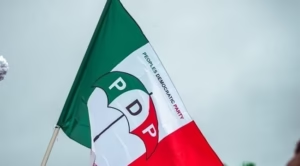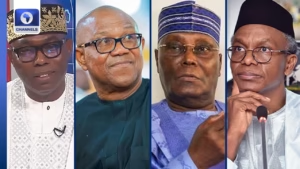Former Jigawa State Governor and founding member of the Peoples Democratic Party, Sule Lamido, has issued a strong warning about the future of Nigeria’s democracy, saying that the collapse of the PDP would create a political vacuum that could usher in authoritarian rule.
Lamido, speaking on Channels Television’s Political Paradigm program on Tuesday, said the PDP remains a critical pillar in Nigeria’s democratic journey.
According to the elder statesman, the weakening or total collapse of the PDP could pave the way for the emergence of a political “emperor,” unchecked by opposition forces.
“If the PDP collapses, Nigeria will collapse. Where there is no opposition, then there will be an emperor. And all emperors are destroyed by their greed,” Lamido said.
He argued that the PDP is not just a political entity but a repository of Nigeria’s political evolution over the past 25 years.
“The PDP is Nigeria’s history in the last 25 years. Therefore, look at the bigger picture — if the party collapses, it is Nigeria’s history that collapses,” he added.

Reflecting on Nigeria’s political trajectory since the return to civilian rule in 1999, Lamido credited the PDP with laying the foundation of the Fourth Republic, making way for the rise of other political figures and parties.
He noted that without the PDP’s efforts in restoring democracy, former President Muhammadu Buhari and incumbent President Bola Tinubu would not have had the platform to ascend to power.
“More than anybody, Tinubu needs PDP to be chasing him, to be on his toes, but when it collapses, nobody will be chasing him; he will be chasing himself,” Lamido stated, insisting he would remain loyal to the party despite ongoing internal strife.
Lamido’s remarks come amid rising political realignments ahead of the 2027 general elections.
With internal divisions and legal battles rocking both the PDP and Labour Party, and dissatisfaction within the ruling All Progressives Congress (APC), a new coalition is gaining momentum.
On March 20, 2025, prominent opposition figures — including Atiku Abubakar (PDP), Peter Obi (Labour Party), and Nasir El-Rufai (APC) — formally announced plans for an inter-party alliance aimed at unseating President Tinubu in 2027.

The alliance is reportedly exploring the Social Democratic Party (SDP) as a potential platform, given its rising appeal amid widespread voter fatigue with the traditional power blocs.
In the 2023 presidential election, Atiku and Obi combined for over 12 million votes, more than four million above Tinubu’s total, although the latter was declared winner by INEC.
With inflation at an all-time high, a cost-of-living crisis, and mounting criticism of Tinubu’s economic policies, the opposition is hoping to capitalise on growing public discontent.
The emerging coalition aims to present a united front to restore what they describe as democratic balance and economic stability.
Sule Lamido’s warning reinforces growing concerns among political observers about the erosion of democratic institutions in Nigeria.
As the battle lines are drawn for 2027, the survival of a strong and credible opposition could be crucial not just for electoral competitiveness, but for the future of Nigeria’s democracy itself.


